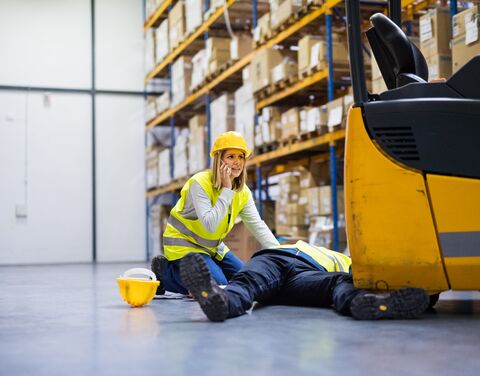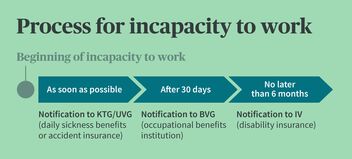
Work-related accidents: How to protect and support your employees
Work-related accidents can happen – in any job and in any industry. What should employers do if an accident occurs? And what are the consequences of an accident in terms of insurance?
Whether at work, during a break, or when working from home: If employees suffer damage to their health here, this is referred to as a work-related accident – at least in most cases. The negative consequences are not only borne by your employees, but also by you as the employer. To protect your employees as well as possible, it is your duty to insure them against accidents. You must also report accidents immediately. However, it is best if an accident at work does not occur in the first place. Ensure a safe workplace design and introduce rules of conduct for dangerous work. This will not only promote employee health, but also productivity at your company.
When is an accident deemed a work-related accident?
If employees have an accident while doing work that they were instructed to do or were doing in your interest, this is referred to as a work-related accident. Examples include tripping in the office on the way to the restroom or a fall at a construction site.
An accident during a break at work also falls into this category. However, the accident must have occurred on company premises or in a place related to the profession in question.
Two examples of accidents during a work break:
- Employees of an electrical company check the switch boxes at an external company
- Forestry workers chop down trees in a wooded area
What insurance applies in the event of a work-related accident?
According to the Swiss Accident Insurance Act (UVG), as an employer you are obligated to insure your employees against work-related accidents. If there is a verified work-related accident, mandatory accident insurance covers all accident costs. The same applies to verified occupational diseases.
Are employees also covered for work-related accidents abroad?
Under the UVG, employees are also insured against occupational accidents abroad, but only under the following conditions:
- Before being posted abroad, an employee must have been compulsorily insured in Switzerland – i.e. they must have worked in Switzerland.
- The activity abroad must be limited in time. The insurance period in EU/EFTA states is 24 months.
- In non-EU/EFTA states, the duration of insurance for all Swiss nationals is determined by the corresponding treaty. In non-treaty states, the UVG determines the duration of insurance. In this case, the insurance coverage is 24 months, but can be extended to six years upon request.
- Once the employment abroad has ended, employees must resume work in Switzerland.
What reporting obligations apply in the event of a work-related accident?
If work-related accident occurs, both employees and employers are obligated to report it. In order to receive continued payment of wages and other benefits from the insurance company in the event of an accident, employees must first report it to you. As an employer, you then report the accident to the accident insurance company by submitting an accident report. Both must be done as quickly as possible so that, among other things, reintegration into the workplace can also take place without any problems.
The following general rule applies: If the insured fulfills their duty of notification in good time, the insurance company can also pay compensation quickly. You can find all the relevant notification deadlines here:

What are the reporting obligations in the event of a work-related accident abroad?
If a work-related accident occurs abroad, the same applies as in Switzerland: In order for an accident to be recognized as an insured event and for continued payment of wages to take place, employees must report a work-related accident to you immediately so that you can notify the relevant insurance provider. As a rule, the insurance provider will cover part of the costs of both outpatient and inpatient treatment and contribute to any transportation costs.
If some of your employees work abroad, additional insurance coverage through UVG supplementary insurance (supplementary UVG) is therefore highly recommended.
Working from home: When is an accident deemed a work-related accident?
In many industries, work is done from home these days. This raises a number of questions with regard to accident insurance: What happens if an accident occurs while the employee is working from home? Do the same conditions apply as for an accident that occurs at the workplace? And does accident insurance cover it to the same extent?
In these cases, an accident in the home office is actually considered a work-related accident:
- Getting a drink from the kitchen: If an employee gets a coffee or a glass of water from the kitchen and has an accident, this is a work-related accident.
- Going to the restroom: Going to the restroom is also essential during working hours. If an employee slips on the way there or back and suffers an injury, this is also considered a work-related accident.
- Accident on the way to and from work: People who work from home generally have no commute to work. However, some employees have to take their children to kindergarten in the morning and pick them up again in the evening, for example. In this case, both the outward and return journeys count as a journey to work. An accident is therefore also covered by mandatory accident insurance in this case.
But private matters are a different situation:
- Taking out the trash: For example, if your employees take trash out to the container during working hours and injure themselves in the process, this is not considered a work-related accident, but their own fault.
In purely insurance terms, working at a desk at home is treated in the same way as being at work. However, you should bear in mind that there may be no witnesses to the accident. It is therefore important to always document accidents accurately.
How to create a safe working environment for your employees
Take safety precautions to prevent work-related accidents at your company. This will protect your employees and yourself from the health and economic consequences of accidents. Protective measures can vary depending on the industry and area of activity. Here are some examples:
Conduct at construction sites
Dangerous and even life-threatening accidents can happen on construction sites. In addition to an introduction to all work equipment and good protective equipment, you should give your employees the following tips:
- Get to know the surroundings before starting work: Where could accident hazards be lurking?
- Secure work areas, e.g. trenches, excavations, scaffolding, roads, sidewalks
- Comply with safety distances
- Maintain eye contact with colleagues and other people present
- Move loads carefully and safely
- Check machines and only operate them according to instructions
- Secure components
- Know electrical circuits and protect yourself from electric shocks
Remind your employees of these precautionary measures on a regular basis. And most importantly: Stop all work if there is any danger. Analyze the situation and discuss it with everyone present. Only when everyone is out of danger can work continue
Conduct in transportation
Accidents can also happen quickly during transportation. Work involving heavy loads, in particular, should be subject to clear rules. To protect your employees from accidents at work and to prevent injury to others, give your employees the following rules:
- Drive safely and with foresight
- Ensure the vehicle undergoes regular maintenance
- Operate and park the vehicle safely at all times
- Secure the load
- Know the weight and center of gravity of the loads when working with a crane
- Maintain calm and concentration
- Adhere to strict break times
Here too, you should inform your employees about all risks and dangers and interrupt all work if a situation becomes too dangerous.
Dealing with hazardous substances
The insidious thing about working with hazardous substances: The danger is often invisible. So before starting work, carry out a hazardous substance analysis and a risk assessment and be particularly careful with the following substances:
- Asbestos
- Asphalt
- Metals
- Mineral oils
- Wood preservatives
Always wear suitable protective equipment and be aware of the substances you are dealing with.
Conduct at the office
Even a simple trip to the coffee machine at the office can lead to a work-related accident. So keep the entire office tidy and make sure that all hallways and stairs are clear. Cables lying around or fluffy carpets in particular can become a tripping hazard. Think ahead and offer your employees regular training or workshops on safety at the workplace.
Accident risks lurk in every industry – even where it doesn't seem like it. So recognize potential risks and take them seriously. The safety of people should be a top priority in all areas.






